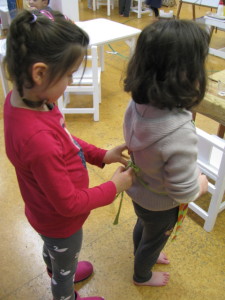By Tania Gaffney – Deputy Principal, Preschool and Primary
This year I have had the privilege of having my workspace situated in the pre-school. It has been 20 or so years since I have spent time within a preschool environment for any great length of time. I have been having a great time watching the kākano (3-6 year olds) and seeing what they are capable of in their environment.
 The other day I walked past 2 little girls on the deck, one was leaning over the other girl’s feet, practically with her nose on them, putting all her effort into helping put the shoes on. When it was finished they both hopped up pleased with the result. No words were even exchanged, but by the looks on their faces, I could tell that each was happy with the outcome. Another time there were two boys on the deck, one helping the other to put on his top. When I first saw them, the top was on and the first boy was saying, as he helped to tug it down, “Mmm, now is it meant to be scrinched up like that?” And it certainly was! I had wondered how he had even managed to get it on. I went away and when I came back they were still there and the top was off again. The helping boy was using his words of encouragement “You nearly got it that time. Let’s try again.” At some stage later I saw them outside working, so I presumed that between them they had sorted it out. For both these scenarios they didn’t need adults to swoop in and help; they were quite capable of sorting it out themselves, because one of them had a few more skills or experience and could help the other where needed.
The other day I walked past 2 little girls on the deck, one was leaning over the other girl’s feet, practically with her nose on them, putting all her effort into helping put the shoes on. When it was finished they both hopped up pleased with the result. No words were even exchanged, but by the looks on their faces, I could tell that each was happy with the outcome. Another time there were two boys on the deck, one helping the other to put on his top. When I first saw them, the top was on and the first boy was saying, as he helped to tug it down, “Mmm, now is it meant to be scrinched up like that?” And it certainly was! I had wondered how he had even managed to get it on. I went away and when I came back they were still there and the top was off again. The helping boy was using his words of encouragement “You nearly got it that time. Let’s try again.” At some stage later I saw them outside working, so I presumed that between them they had sorted it out. For both these scenarios they didn’t need adults to swoop in and help; they were quite capable of sorting it out themselves, because one of them had a few more skills or experience and could help the other where needed.
In Montessori we strive to guide ākonga towards independence in many different ways. Examples include the way in which the class is set up, the lessons that are given in the area of practical life and the amount of adult intervention that we allow. A well-known saying in Montessori is, “Every unnecessary help is a hindrance to the development of the child.”
As human beings, we strive for independence, not only so we can help ourselves, but so that we have the skills to be able to help others. We might be highly skilled in one area, but not quite so capable in another and this therefore grants the opportunity for others to be able to help us and for us in turn to reciprocate by assisting them.
It’s sometimes easy for us as adults to forget just how much our small children are capable of, given the right guidance. The trick we adults should always try and remember is to stand back, instead of rushing in and instead, let our children develop this side of themselves – it is a gift they deserve to have.